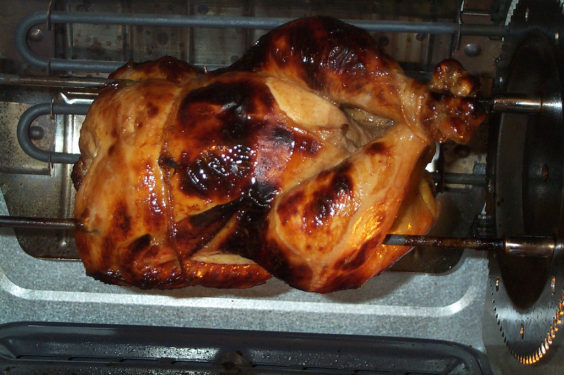Extreme couponers can often get many of their groceries for free. But one Florida woman has taken that to an even greater extreme. She’s boasting of how she managed to score more than $2,000 worth of rotisserie chickens from her local Publix – without ever using a single coupon.
How did she do it? Well, she’s decided to divulge her secret, now that the jig is up.
57-year-old Janet Feldman of Davie, Florida told her tale to South Florida’s Sun Sentinel newspaper. Her strategy involved a liberal interpretation of the “Publix Promise”, the Florida-based grocery chain’s price guarantee program.
“If during checkout, the scanned price of an item exceeds the shelf price or advertised price, we will give the customer one of that item free,” the policy states. The price guarantee can often turn a potentially tense checkout situation into a nice surprise, when a shopper who’s inadvertently overcharged for an item ends up getting it for nothing.
Feldman managed to turn that policy on its head, though, by actively seeking out items she knew she’d be overcharged for. So she’d head straight for the deli, and the rotisserie chickens.
About a year ago, Feldman said she noticed the chickens seemed somewhat puny, even though all of the prelabeled packages said they weighed 32 ounces. So she weighed them herself, using the scales in the produce department, and found that many of them came in at less than 32 ounces. She complained to management, who “promised they would do something,” she told the Sun Sentinel.
And when they didn’t – she did.
Using the argument that she was being overcharged for underweight items, she invoked the Publix Promise – and got a $7.39 bird for free. So she did it again at another Publix. And again, and again, and again. Over the past year, she estimates that she scored more than 300 rotisserie chickens, many of which she donated to local animal rescue organizations.
The Publix Promise says only the first mispriced item will be free, and any other of the same items will be charged at the lower price. So in order to get her chickens for nothing, Feldman had to buy them one at a time. At one point, she even visited 11 different Publix stores in one day and loaded up her car with chicken.
While acknowledging that her tactics might seem “a bit excessive,” she told the paper, the fact remains that she “would not get a single free chicken if they all weighed at least 32 ounces.”
Her method is generating intensely divided reactions among fellow supermarket shoppers. Some say she’s taking advantage of the store’s policy, and potentially ruining it for everyone else if Publix decides to rethink its guarantee. “Wow! Talk about abusing the policy!” one commenter on the Sun Sentinel’s Facebook page wrote. “Driving all around town to hunt for tiny chickens and doing it for a year is exploitation,” another commented. “Publix needs to tighten up on all these scam artists,” said a third reader.
But others say Feldman is just holding the company accountable. “Why didn’t Publix learn to weigh them correctly?” another commenter wrote. “They had plenty of time to fix this but chose to keep overcharging customers.” Opined another, “the only scam is Publix misrepresenting the weight of food they’re selling by the pound!”
Publix is, perhaps, fortunate that it only cost the company around $2,217 to give Feldman her 300 free chickens. It could have been a lot worse. In some states, it could have cost them millions.
In California, for example, several retailers have been fined for similar actions. Last month, Safeway agreed to pay $2.25 million to settle claims from nine counties that it overcharged customers and misrepresented the weights of some products. The counties’ complaint also accused Safeway of violating a 2008 injunction that required it to institute and consistently honor its own get-overcharged, get-it-free policy, just like the “Publix Promise”. California’s Fresh & Easy was fined $833,000 last year for similar violations, and Kroger subsidiary Ralphs paid $1.1 million for overcharging customers on weighed food products in 2012.
At any rate, Publix says the underweight-chicken problem has been addressed. Publix’s supplier had always provided chickens that weighed in at more than two pounds, Publix spokeswoman Nicole Krauss told the Sun Sentinel. So employees never bothered weighing them before putting them in boxes with “32 ounce” labels on them. But last winter, the chickens started coming in smaller than usual, a problem that Krauss says has since been resolved. And if a stray small chicken does get through? “Publix delis have been informed to weigh rotisserie chickens that seem underweight and price them appropriately, or use those chickens in other deli recipes,” she told the paper.
So Feldman’s free-chicken express appears to be at an end. But the debate over her tactics appears to be just beginning.















Hmmm. I don’t think she at all abused the policy but I can’t imagine what she spent on gas and time to get all those free birds. Hardly seems worth the effort. I wouldn’t do it but I don’t think she did anything wrong. Crazy maybe, time consuming and excessive for sure, but not illegal.
KK @ Preppy Pink Crocodile